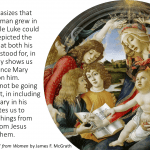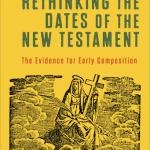I shared some thoughts in comments on this blog related to mythicism and historical method. First, here is what I said in response to a claim attributed to Robert M. Price to the effect that the criterion of dissimilarity and the criterion of embarrassment are in tension with one another:
Saying that there was a reason for everything to be included or else it would not have is as true and as untrue in the case of the Gospels as any other historical or fictional works. One reason for including things was that Jesus said them and he was felt to be authoritative, even if they were unsure what he meant. Another was that enemies insisted on remembering something Jesus said that his followers and supporters would have preferred he hadn’t and needing to do damage control. The notion that dissimilarity and embarrassment are at odds as principles for evaluating material simply is not true.
On Jesus and John as possibly thought of by Gospel authors as akin to Elijah and Elisha, and Jesus as new Moses in Matthew:
Comparing two people to biblical counterparts has no bearing on their historicity. I always signed my messages to my mentor Jimmy Dunn “James the Lesser” and that makes neither us nor the historicity of the connection between us any less likely. The notion that echoing the Bible suggests invention is one of those truly bizarre mythicist arguments that really needs to be laid to rest.
I think that we determine this as an aim of Matthew by seeing how he edits his source material. By looking at other texts which also tell of Jesus’ life and teaching we can see some of what Matthew has done. The infancy story would be of doubtful historicity apart from that, simply because of its genre and the miraculous elements. The reasoning “related to Moses as type, therefore invented” could, in the absence of other evidence, lead one to assume that not only the organization and location of the Sermon on the Mount is fabricated but all the contents thereof. Yet Luke/Q and the letters of Paul provide evidence that that is not the case. It is also conceivable in theory that Jesus could have seen himself as a Moses-like figure. Many historical people take earlier heroes of their faith or nation as prototypes. For these reasons resemblances are not a basis for determination of historicity on their own.
Bart Ehrman asked why Paul didn’t say more about the historical Jesus. I think the answer to this question is multifaceted. On the one hand, writing letters to Christian communities to which Paul had conveyed what he knows about Jesus’ life and teaching, nothing more than allusions was called for in most instances. Writing was not the easy activity it is in the experience so many of us today take for granted, and one didn’t write what wasn’t deemed necessary. It was time-consuming and expensive, among other things. On the other hand, Paul’s authority was regularly being challenged by people who claimed to have a direct connection to better sources of information about Jesus. Could you imagine if Paul put what he had heard in writing and it was challenged by someone who felt they could say “actually, Paul gets that wrong, the Jerusalem apostles who knew Jesus more directly said this…”? There was nothing to gain from writing more about what Jesus said and did, and a lot for Paul to risk losing if he did so.
Mike Bird has been blogging about Christology quite a bit lately. In one blog post he shared several quotes about Jesus’ “divine” status. For a long time scholars (other than the most conservative) have argued that the key development in Christology is from Jesus as supreme human agent of the one God endowed with divine authority second only to the one God, to Jesus as one who is ontologically what he was initially understood to be functionally. But that’s an anachronistic way of putting it and misses that being given the divine name and exalted to divine status involved a transformation of status AND of essence. Perhaps the best way to put it is that the key development is from Jesus as one who is made to be functionally and ontologically God’s viceroy, to one who occupied that status and had that essence for all eternity.
Dale Tuggy blogged twice about Mark 13:32: once on R. T. France’s treatment of it, and once on the NET Bible.
Also of related interest:
The Surprisingly Long History of the Conspiracy Theory that Rome Didn’t Exist
Ian Paul provides his annual reminder that Jesus wasn’t born in a stable
Mike Bird asks, “Did Jesus Claim to be the Messiah?”
Bob Cornwall on the “beginning of birthpangs”
Free book digitized:
https://biblicalstudies.org.uk/blog/jewish-and-christian-messiah-by-vincent-henry-stanton/
Interview with Amy-Jill Levine:
Valerie Tarico continues to turn to a “history buff” rather than historians as her primary source when it comes to ancient figures such as Jesus, which is disappointing, but I’m glad she at least makes reference and links to Bart Ehrman and I.













